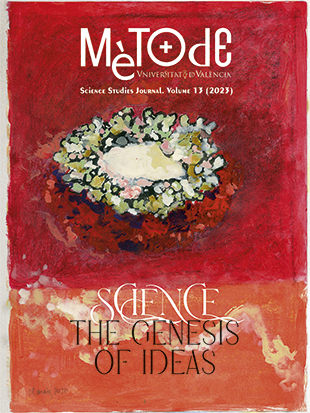Science and policy to combat desertification: The institutional response to a global challenge
DOI:
https://doi.org/10.7203/metode.13.21901Keywords:
UNCCD, drylands, land degradation, drought, science-policy interface Abstract
Abstract
Desertification is a controversial concept whose nature, extent, causes, and potential solutions are still debated. This paper reviews the arguments put forward for considering desertification a global environmental challenge. We also analyse the institutional response within the United Nations system, especially that of the United Nations Convention to Combat Desertification (UNCCD). Thus, the most significant elements of the desertification debate are analysed with respect to their scientific and political dimensions. The text concludes by discussing the need to establish an integrated framework for assessing and responding to desertification that is validated by a science-policy interface.
 Downloads
Downloads
 References
References
Akhtar-Schuster M., Amiraslani, F., Diaz Morejon, C. F., Escadafal, R., Fulajtar, E., Grainger, A., Kellner, K., Khan, S. I., Perez Pardo, O., Sauchanka, U., Stringer, L. C., Reda, F., & Thomas, R. J. (2016). Designing a new science-policy communication mechanism for the UN Convention to Combat Desertification. Environmental Science & Policy, 63, 122–131. https://doi.org/10.1016/j.envsci.2016.03.009
Carr, S., & Mpande, R. (1996). Does the definition the issue matter? NGO influence and the international Convention to Combat Desertification in Africa. The Journal of Commonwealth and Comparative Politics, 34(1), 143–166. https://doi.org/10.1080/14662049608447720
Corell, E. (1999). The negotiable desert: Expert knowledge in the negotiations of the convention to combat desertification. Linkoping Studies in Arts and Science No. 191. Linkoping University.
King, C., & Thomas, D. S. G. (2014). Monitoring environmental change and degradation in the irrigated oases of the Northern Sahara. Journal of Arid Environments, 103, 36–45. https://doi.org/10.1016/J.JARIDENV.2013.12.009
Martinez-Valderrama, J., Guirado, E., & Maestre, F. T. (2020). Desertifying deserts. Nature Sustainability, 3, 572–575. https://doi.org/10.1038/s41893-020-0561-2
Martinez-Valderrama, J., Sanjuan, M. E., del Barrio, G., Guirado, E., Ruiz, A., & Maestre, F. T. (2021). Mediterranean landscape re-greening at the expense of South American agricultural expansion. Land, 10(2), 204. https://doi.org/10.3390/land10020204
Mirzabaev, A., Wu, J., Evans, J., Garcia-Oliva, F., Hussein, I. A. G., Iqbal, M. H., Kimutai, J., Knowles, T., Meza, F., Nedjraoui, D., Tena, F., Turkeş, M., Vazquez, R. J., & Weltz, M. (2019). Desertification. In P. R. Shukla, J. Skea, E. Calvo Buendia, V. Masson-Delmotte, H.-O. Portner, D. C. Roberts, P. Zhai, R. Slade, S. Connors, R. van Diemen, M. Ferrat, E. Haughey, S. Luz, S. Neogi, M. Pathak, J. Petzold, J. Portugal Pereira, P. Vyas, E. Huntley, … J. Malley (Eds.). Climate change and land: An IPCC special report on climate change, desertification, land degradation, sustainable land management, food security, and greenhouse gas fluxes in terrestrial ecosystems. IPCC.
Mortimore, M. (2016). Changing paradigms for people-centred development in the Sahel. In R. Behnke & M. Mortimore (Eds.), The end of desertification? (pp. 65–98). Springer. https://doi.org/10.1007/978-3-642-16014-1
Mortimore, M., Anderson, S., Cotula, L., Davies, J., Faccer, K., Hesse, C., Morton, J., Nyangena, W., Skinner, J., & Wolfangel, C. (2009). Dryland opportunities: A new paradigm for people, ecosystems and development. IUCN, IIED, & UNDP/DDC.
Porter, G., & Brown, J. W. (1991). Global environmental politics. Westview Press.
Safriel, U. (2009). Deserts and desertification challenges but also opportunities. Land Degradation and Development, 20, 353–366.
Stafford-Smith, D. M. (2016). Desertification: Reflections on the mirage. In R. Behnke & M. Mortimore (Eds.). The end of desertification? (pp. 539–560). Springer. https://doi.org/10.1007/978-3-642-16014-1
Stafford-Smith, D. M., & Reynolds, J. F. (2002). The Dahlem desertification paradigm: A new approach to an old problem. In J. F. Reynolds & D. M. Stafford-Smith (Eds.), Global desertification. Do humans cause deserts? (pp. 403–424). Dahlem University Press.
Stringer, L. (2008). Can the UN Convention to Combat Desertification guide sustainable use of the world’s soils? Frontiers in Ecology and the Environment, 6(3), 138–144. https://doi.org/10.1890/070060
Thomas, R. J., Akhtar-Schuster, M., Stringer, L. C., Marques, M. J., Escadafal, R., Abraham, E., & Enne, G. (2012). Fertile ground? Options for a science-policy platform for land. Environmental Science & Policy, 16, 122–135. https://doi.org/10.1016/j.envsci.2011.11.002
Thomas, D. S. G., & Middleton, N. (1994). Desertification: Exploding the myth. John Wiley & Sons.
Tiffen, M., Mortimore, M., & Gichuki, F. (1994). More people less erosion: Environmental recovery in Kenya. John Wiley.
Toulmin, C. (2001). Lessons from the theatre: Should this be the final curtain call for the Convention to Combat Desertification? WSSD Opinion Series. International Institute for Environment and Development.
Toulmin, C., & Brock, K. (2016). Desertification in the Sahel: Local practices meets global narrative. In R. Behnke & M. Mortimore (Eds.), The end of desertification? (pp. 37–64). Springer. https://doi.org/10.1007/978-3-642-16014-1
UNCCD. (1994). The United Nations Convention to Combat Desertification in those countries experiencing serious droughts and/or desertification, particularly in Africa. Secretariat of the United Nations Convention to Combat Desertification.
Verstraete, M. M. (1986). Defining desertification: A review. Climate Change, 9, 5–18. https://doi.org/10.1007/BF00140520
Vogel, C., H., & Smith, J. (2002). Building social resilience in arid ecosystems. In J. F. Reynolds & D. M. Stafford-Smith (Eds.), Global desertification. Do humans cause deserts? (pp. 149–166). Dahlem University Press.
Downloads
Published
How to Cite
-
Abstract1655
-
PDF690
Issue
Section
License
![]()
All the documents in the OJS platform are open access and property of their respective authors.
Authors publishing in the journal agree to the following terms:
- Authors keep the rights and guarantee Metode Science Studies Journal the right to be the first publication of the document, licensed under a Creative Commons Attribution-NonCommercial-NoDerivatives 4.0 International License that allows others to share the work with an acknowledgement of authorship and publication in the journal.
- Authors are allowed and encouraged to spread their work through electronic means using personal or institutional websites (institutional open archives, personal websites or professional and academic networks profiles) once the text has been published.





